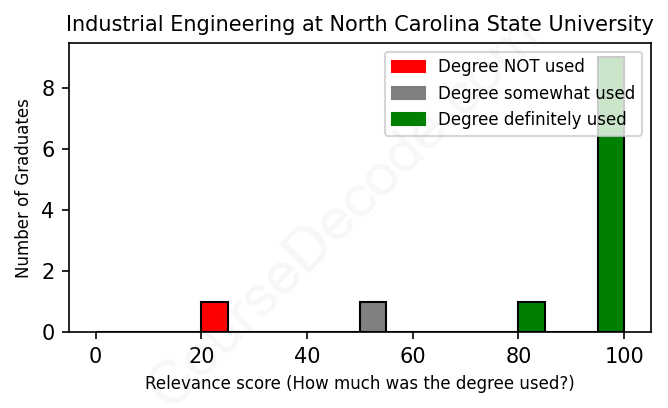
First, some facts. Of the Industrial Engineering graduates from North Carolina State University we've analyzed , here's how many have used (or NOT used) their degree in their career:

These are estimates based on AI analysis of 12 LinkedIn profiles (see below).
The verdict? Significantly above average. Overall, with an average relevance score of 87%, Industrial Engineering graduates from North Carolina State University have a much higher likelihood (+20%) of finding work in this field compared to the average graduate across all fields:
And for comparison, here's the chart for all profiles we've looked at across all degrees.
Also, after graduating, only 16% of these graduates have pursued further education other than another Bachelor's degree (such as a Masters degree or other), compared to the average across all profiles of 35%. This suggests a Bachelors degree is enough for most Industrial Engineering graduates, and it's normal to look for work straight after graduation.
See the details:
|
Relevance score: 82% We think this person has gone into a career highly relevant to their degree. We think this person has gone into a career highly relevant to their degree.
DEGREE INFOGraduated in 2020 from North Carolina State University with a Bachelor of Science - BS in Industrial Engineering. No other secondary education since. JOB HISTORY SINCE GRADUATIONBusiness Analyst Vuram Oct 2020 - Feb 2022 Appian Developer  Vuram Feb 2022 - Present ABOUTHyperautomation Consultant at WNS-VuramNorth Carolina State University - Class of 2020Bachelor of Science in Industrial & Systems Engineering with Minor in Statistics |
The top 10 most common jobs done by the graduates we've analyzed (ranked most common to least) are:
From the list of jobs held by graduates of North Carolina State University's Industrial Engineering program, it's clear that many have found careers closely related to their degree. Positions like Sr. Engineer Tech, Management Engineer, Continuous Improvement Manager, and various consulting roles highlight the tendency of alumni to engage in fields that emphasize process optimization, operational efficiency, and project management. It's interesting to see a strong representation in healthcare, engineering, and manufacturing sectors, where analytical thinking and systems optimization are crucial. Internships and research roles also show that many graduates start with hands-on experience directly related to their studies, which sets a solid foundation for their careers afterward.
However, not all positions clearly align with industrial engineering principles. Jobs like IT Operations Engineer and various sales roles (like those at Cisco) showcase a shift away from core engineering tasks, leaning more toward IT management or client relations. Although some skills may overlap, these positions don't fully utilize the specialized industrial engineering training they received. That said, the majority of the careers listed are indeed relevant to the field, demonstrating that a degree in Industrial Engineering from NC State offers valuable pathways toward a variety of careers that leverage their education effectively.
Here is a visual representation of the most common words in job titles for Industrial Engineering graduates (this is across all Industrial Engineering graduates we've analyzed, not just those who went to North Carolina State University):

When looking at the career paths of graduates from North Carolina State University who studied Industrial Engineering, it's pretty clear that many of them have landed solid jobs right after graduation and continued to move up in their respective fields. For instance, a lot of graduates start off in roles like management engineering or as quality control specialists, as seen with those from 2017 and 2018. This trend suggests that they’re able to leverage their skills early on, gaining hands-on experience in various engineering and management roles which perfectly align with their degree.
Fast forward five to ten years, and many of these graduates have climbed the corporate ladder, often taking on managerial or consultant roles. Examples like the 2017 graduate who moved from management engineer to director at Huron clearly illustrate this upward trajectory. While some have ventured into consulting, project management, or even new tech roles, the overall vibe is that these grads are finding ways to incorporate their Industrial Engineering education into their careers. So, if you're considering this major, it seems like a great pathway to build a rewarding career in engineering or a related field! You won't just be stuck in some random job; you can really thrive and grow in your chosen profession.
Honestly, pursuing a Bachelor’s degree in Industrial Engineering, whether at North Carolina State University or elsewhere, can be pretty challenging but rewarding. You're diving into a mix of math, science, and some real-world problem-solving, which can get intense at times. The workload is often heavy, with lots of projects, homework, and exams that require critical thinking and application of concepts. It’s definitely not the easiest degree out there, but if you enjoy problem-solving and aren't afraid of a little hard work, you'll probably find it manageable and even enjoyable! So, if you’re ready to roll up your sleeves and tackle some tough material, you’ll likely do well.
Most commonly, in the LinkedIn profiles we've looked at, it takes people 4 years to finish a Bachelor degree in Industrial Engineering.
Looking at these graduates from North Carolina State University, it seems like most of them are doing pretty well money-wise. Those who graduated earlier, like the 2011 grad, have moved into senior engineering roles, which typically pays well. The 2017 grads seem to be climbing the ladder fast, with one already hitting director level, which usually means a solid paycheck. Even the more recent grads from 2020 and beyond are landing roles that have good growth potential, like continuous improvement managers and account managers at big companies. Overall, it looks like they’re on a good path to tackle some decent salaries as they advance in their careers.
Here is a visual representation of the most common words seen in the "about" section of LinkedIn profiles who have a Bachelor degree in Industrial Engineering (this is across all Industrial Engineering graduates we've analyzed, not just those who went to North Carolina State University). This may or may not be useful:

Here are all colleges offering a Bachelor degree in Industrial Engineering (ordered by the average relevance score of their Industrial Engineering graduates, best to worst) where we have analyzed at least 10 of their graduates:
| College | Score | Count |
|---|---|---|
 Iowa State University Iowa State University
|
88 | 11 |
 North Carolina State University North Carolina State University
|
87 | 12 |
 California Polytechnic State University-San Luis Obispo California Polytechnic State University-San Luis Obispo
|
87 | 15 |
 Texas A&M University Texas A&M University
|
83 | 39 |
 Purdue University Purdue University
|
81 | 36 |
 University of Central Florida University of Central Florida
|
80 | 23 |
 Georgia Institute of Technology Georgia Institute of Technology
|
80 | 59 |
 Penn State University Penn State University
|
79 | 16 |
 Texas Tech University Texas Tech University
|
79 | 10 |
 University of Pittsburgh University of Pittsburgh
|
79 | 15 |
 University of Washington University of Washington
|
78 | 12 |
 University of Arkansas University of Arkansas
|
78 | 11 |
 University of Wisconsin-Madison University of Wisconsin-Madison
|
76 | 13 |
 University of Illinois at Urbana-Champaign University of Illinois at Urbana-Champaign
|
73 | 15 |
 West Virginia University West Virginia University
|
71 | 19 |
 Clemson University Clemson University
|
69 | 23 |
 University of Florida University of Florida
|
64 | 11 |